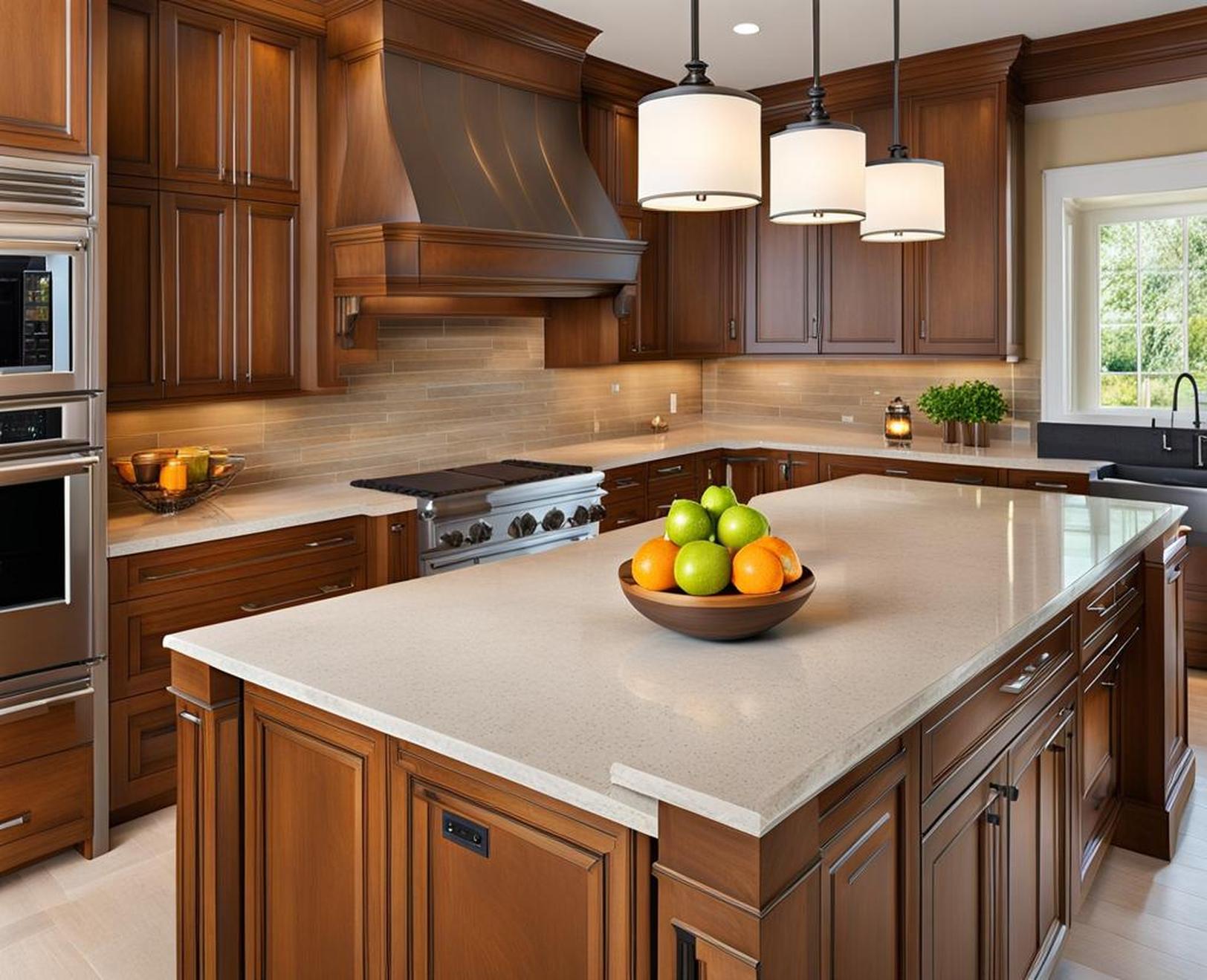When it comes time to choose new countertops for your kitchen or bathroom, two of the most popular options are solid surface and quartz. Both offer sleek, modern designs and better durability than materials like laminate. But there are some key differences between solid surface vs. quartz countertops that you’ll want to understand before deciding which is right for your home.
We’ll also answer some of the most common questions homeowners have when choosing between these two premium countertop materials.
Solid Surface Countertops
What is Solid Surface?
Solid surface countertops were first introduced by DuPont in 1967 under the brand name Corian. This type of countertop is made from a blend of natural minerals and acrylic resin. Popular brands of solid surface materials include Corian, Avonite, and Swanstone.
Because solid surface is man-made, it can be molded into virtually any shape, including integrated sinks and countertops with seamless appearances. The material is also renewable – scratches and damage can often be sanded down and buffed away.
Benefits of Solid Surface
- Seamless, molded appearance for integrated sinks and counters
- Easily renewable – scratches and damage can be repaired
- Large variety of colors and patterns
- Nonporous – does not require sealing
- More affordable than natural stone
Drawbacks of Solid Surface
While solid surface offers many advantages, the material does have some downsides:

- Not as resistant to heat, impact, or stains as quartz
- Requires more routine maintenance than quartz
- Can scorch or blister at very high temperatures
- Seams may be more visible on some installations
Quartz Countertops
What is Quartz?
Quartz countertops are engineered stone made from approximately 95% ground natural quartz and 5% polymer resins. Brands like Caesarstone, Silestone, and Cambria all offer popular quartz countertop options.
Since quartz is an engineered product, it creates a harder, non-porous surface than natural stone. This makes it more durable and ideal for busy kitchens.
Benefits of Quartz
- Extremely durable – resistant to scratches, chips, cracks
- Low maintenance – doesn’t need frequent sealing or polishing
- Resists stains, heat damage, bacteria growth
- Consistent colors and patterns
Drawbacks of Quartz
The downsides of quartz countertops include:
- Higher price tag than solid surface
- Seams may be more visible
- Limited color and pattern options
- Chips and cracks cannot be easily repaired
Comparison of Solid Surface vs. Quartz Countertops
Composition
While neither material is completely natural, quartz contains a higher percentage of natural stone than solid surface. Solid surface is composed of about one third acrylic resins, while quartz contains over 90% ground quartz.
Appearance
Solid surface can be seamlessly molded into countertops and sinks for a continuous look. Quartz slabs must be pieced together, often leaving small seams more visible.
Durability
Quartz is harder and more scratch resistant than solid surface. It also better resists heat damage, stains, and bacterial growth. However, solid surface is renewable and minor damage can be repaired.
Maintenance
Quartz requires very little maintenance beyond cleaning. Solid surface needs occasional polishing and resealing to keep cracks and scratches at bay.
| Factor | Solid Surface | Quartz |
|---|---|---|
| Cost | $$ | $$$ |
| Durability | Good | Excellent |
| Maintenance | Medium | Low |
Pricing
On average, solid surface countertops range from $40-100 per square foot installed. Quartz slabs run between $80-150 per square foot installed. Exact pricing depends on the brand and complexity of the project.
Warranties
Solid surface countertops often come with a 10-year manufacturer’s warranty. Most quartz counters have a 15-year warranty against defects.
Choosing the Right Countertop for Your Lifestyle
When deciding between solid surface vs. quartz, consider how you use your kitchen and what your priorities are:
- If you cook often and need maximum surface durability, quartz is the better choice.
- If you want an affordable, seamless look, solid surface may be ideal.
- Concerned about bacteria? Quartz resists microbial growth better than solid surface.
- If repairability is important, solid surface allows you to sand away damage.
Be sure to request free estimates for solid surface and quartz countertop installation. Comparing bids can help you make the most cost-effective decision for your kitchen remodeling budget.
FAQs
Is quartz or solid surface more durable?
Quartz countertops are more durable than solid surface. The high percentage of natural stone makes quartz very hard and resistant to chips, cracks, scratches, heat, stains, and more.
Which material is more budget-friendly?
Solid surface countertops are typically the more affordable option. But quartz costs can vary widely between brands, so be sure to get quotes for both.
Which countertop feels more like real stone?
With its high percentage of ground quartz, quartz countertops better imitate the look and feel of natural stone. Solid surface has a more uniform, man-made appearance.
When choosing between solid surface vs. quartz countertops, consider how you use your kitchen, your budget, and your style preferences. Both offer sleek, modern options that are more durable than laminate.
Solid surface countertops provide a streamlined, seamless appearance for a lower price. Quartz counters offer superior durability with a stone-like look and feel.
Be sure to request free estimates as you compare solid surface vs. quartz countertops for your next kitchen or bath remodeling project.
